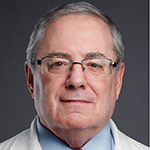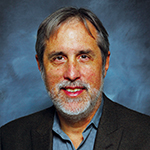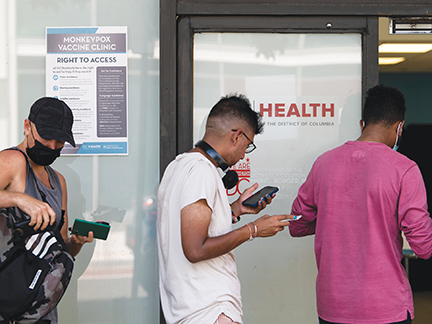By LISA EISENHAUER
In Dr. Jorge Parada's view, the declaration of monkeypox as a national health emergency is both blessing and potential curse.

Parada
Parada is medical director and committee chair of infection control and protection at Loyola Medicine, which is based in suburban Chicago and a member system of Trinity Health. He said the declaration that the secretary of the Department of Health and Human Services issued Aug. 4 frees up resources to expand testing, treatment and vaccination to combat the spread of the virus.
But with monkeypox so far infecting a relatively small sector of the U.S. population and resulting in mostly short-lasting symptoms of two to four weeks duration, Parada worried that the proclamation could raise undue alarm.
"My main concern is it's going to make everybody panic and this isn't as of yet, and I don't really think it will become, a threat to the general population," he explained.
Other infectious disease specialists within the Catholic health ministry said that while they, like Parada, are keeping a close watch on the virus, they are urging caution rather than alarm in response.

Baily
Dr. Charles Bailey, infectious disease specialist at Providence Mission Hospital in Mission Viejo, California, said that despite being in the state with the second-highest case count, even populous Orange County, where Mission Hospital is located, has
had relatively few monkeypox diagnoses.
As of Aug. 17, the California Department of Public Health reported 57 monkeypox cases in the county of more than 3 million and 2,356 cases statewide. California's overall total was second among states only to New York's, which the Centers for Disease
Control and Prevention put at 2,620 cases. Nationwide, the CDC reported 12,689 cases.

Men line up at one of three walk-up DC Health department monkeypox vaccination clinics in Washington on Aug. 5.
Bailey added that the cases he was aware of almost exclusively traced to what has become the nation's hardest-hit population: young men who have sex with other men. What is most needed to keep the virus in check, he said, is changes in behavior among
that high-risk group and awareness of how to avoid contracting the virus among the general population.
COVID comparisons
The fact that the nation is still dealing with the devastating and unpredictable COVID-19 pandemic is no doubt heightening the tension around the monkeypox outbreak, Bailey and others said. They noted, however,
that the viruses are very different in terms of transmission and risk.
Monkeypox "is not easily transmitted, certainly nothing like COVID, nothing like smallpox, which is a related virus," Bailey explained. Transmission "requires close, prolonged, usually intimate contact with an infected person. So, the general public is
at very limited risk of this at large."

Taylor
Dr. Katie Veron Taylor, infectious disease specialist with Our Lake of the Lake Regional Medical Center in Baton Rouge, Louisiana, said as of Aug. 4 there had been four monkeypox cases reported at the hospital or its clinics. In each case, she said, the
symptoms have been minor, such as sore throats and the rash with lesions from which the virus is spread. Our Lady of the Lake is part of the Franciscan Missionaries of Our Lady Health System.
Taylor said monkeypox is far from reaching the designation of a pandemic because it isn't contagious or widespread enough and because it is not posing a severe risk of death. As of mid-August, the CDC had no reports of deaths linked to monkeypox. No agency
appeared to be tracking hospitalizations from the virus nationwide.
As for any illness, Taylor said, the threat of monkeypox was worst for those whose health is already compromised, such as the frail elderly and people with chronic medical conditions. "I'm not as concerned about the health risks as when COVID began and
I feel like we're prepared to take it on, but of course any communicable disease is something to be concerned about and we want to limit the spread as much as possible," she said.
Taylor and others said the COVID pandemic provided lessons that could serve the medical sector and the public well in the monkeypox outbreak.
Taylor pointed out that health care workers have gotten plenty of experience over the last two years at protecting themselves while testing and treating contagious patients. "From a health care provider standpoint, it makes it easier for us because most
of the guidance for monkeypox is very similar to COVID — masks and gowns and stuff like that and what precautions we need to do," she said.
Meanwhile, she said people who suspect that they might have been infected are likely aware that they should avoid close contact with others and get tested, just as they have been urged to do for the last two years for suspected cases of COVID.
Treatments, vaccine scarce
The bigger challenge, people closely watching the monkeypox outbreak said, is providing the testing, treatment and vaccinations — all of which are, or until recently were, in limited supply.

Thannum
Stephanie N. Thannum is a registered nurse and division manager of infection prevention for the nine Illinois hospitals within the Hospital Sisters Health System. Until July, she said, monkeypox testing was only available through state labs. Thannum
said state lab testing requires approval from the county health department, transporting the specimen to the lab and awaiting a call or fax with the results. Now commercial labs are doing monkeypox testing and requests can be submitted and results
received through HSHS hospitals' electronic medical records systems.
"We've found the state lab to be an invaluable resource for testing patients, and in some situations they will still be our resource," Thannum said. "However, having options in how we get testing for our patients is a game changer. It also allows
for less manual paperwork as we can follow our normal day-to-day processes."
She noted that while monkeypox tests are not readily available at drugstores, as COVID tests have become, the testing is more accessible than testing was for the coronavirus early on.
Also unlike in the early days of COVID, there are treatments available for monkeypox. However, Parada noted that the medications aren't exactly easy to access. For example, tecovirimat, a medication commonly called TPOXX, is being used to treat the
virus although it hasn't gotten approval from the Food and Drug Administration for any use except to treat smallpox. The drug is only being supplied by the CDC through state and local agencies and given to patients who sign a five-page informed consent.
Vaccines, too, are not easily accessible. The CDC recommends the two-dose vaccine, given by injection, "for people who
have been exposed to monkeypox and people who may be likely to get monkeypox." The agency is overseeing distribution of the drugs, which are in limited supply and mostly available through state and local health departments. Those agencies are
setting their own rules on who can get the vaccinations.
In Louisiana, the state Department of Health has set up a monkeypox page on its website. It notes that "given how little vaccine we have received" only two groups
are eligible: those with known exposures and those with a high risk of exposure. It says the second group includes men who have had sex with men in the last 14 days.
On Aug. 9, the FDA announced a plan to split doses of the vaccine to stretch the supply.
Many unknowns
With the monkeypox outbreak widening, Loyola Medicine is among the health systems that have adopted a strategy to educate their staffs on best practices for protecting themselves and for testing and treating patients.
Parada said the system in early August added to its internal website a section with guidance on monkeypox that is getting continual updates. In addition, in-service trainings were planned so managers could advise their staffs at start-of-shift
huddles on monkeypox protocols.
Parada pointed out that while the nation had something of a jump on monkeypox compared to COVID in terms of testing, treatment and vaccination, there is still much that is unknown. For example, there is recent evidence that suggests the virus could be spread in semen by people with no symptoms of the illness.
There is also the mystery of why a disease that should be easily contained continues to spread. "This has been going on long enough that some of the people were infected when the word was already out that this was going on and it hadn't radically
changed behaviors," Parada said. "So that concerns me."
For now, the infection specialists said their systems are leaving public-facing campaigns related to monkeypox to state and local health officials. They said that could change if the virus becomes a more widespread threat or of particular concern
in their communities.
Thannum, for example, said even though the communities served by HSHS' Illinois hospitals so far have been largely spared by the monkeypox outbreak, she was prepared and willing to speak to groups about the virus, as she often has done about COVID,
if requested.